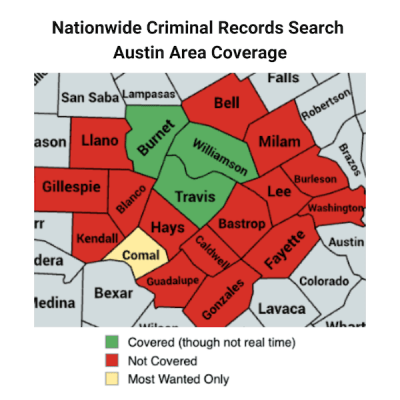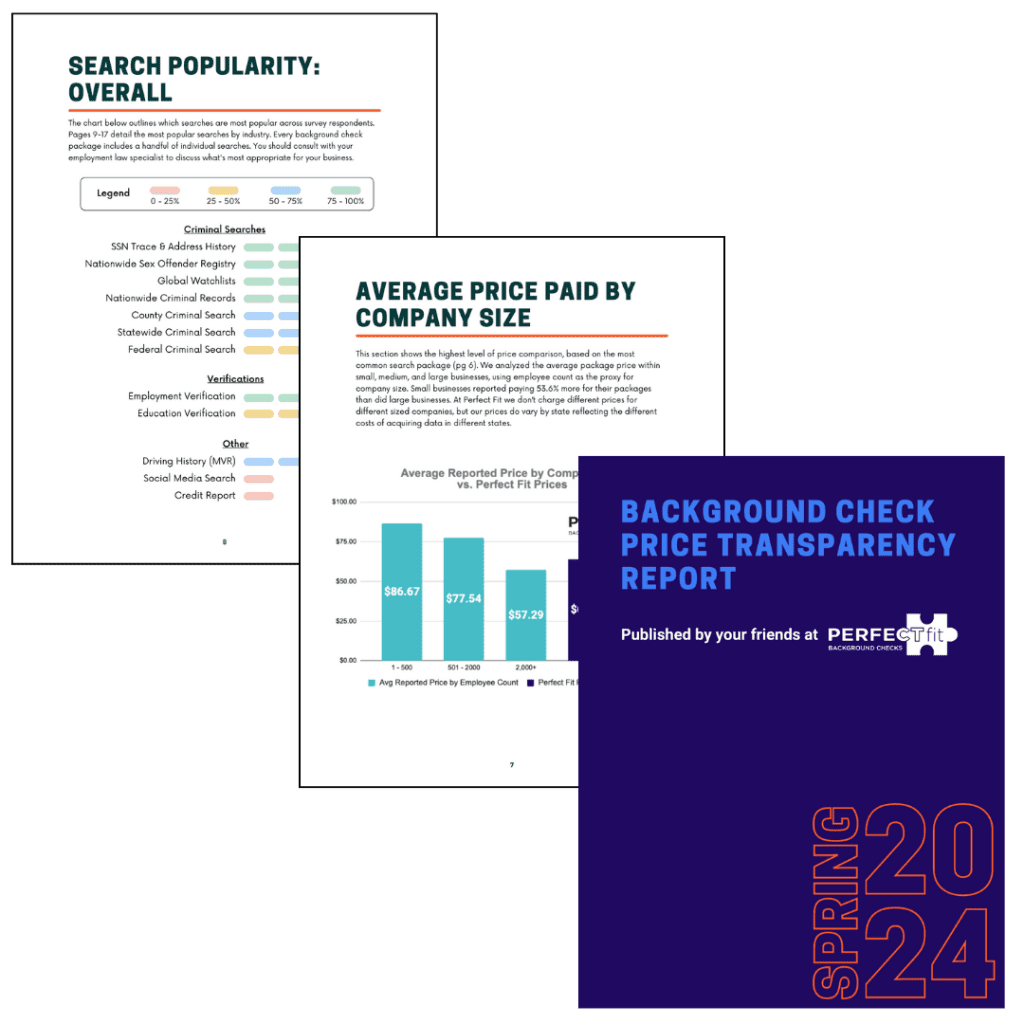Unveiling the Truth: Why Background Checks Miss Records and How to Bridge the Gaps
Folks new to criminal background checks often, understandably, expect it to be a fairly straightforward process. They give us a name, we check a list of records, and return the results, but it’s not that simple.
When running a background check, if someone wanted to check every single possible source, it would cost tens of thousands of dollars. Our goal is to provide you with a balance of comprehensiveness and affordability. Even when plugged into more than 5,000 data sources, there are still occasions where a record doesn’t show up on a background check.
Whether you’re a business owner, a human resources employee, or a recruiter, understanding why and where these coverage gaps might occur is crucial to anticipating potential situations before they occur and fine tuning your package to match your risk tolerance.
Importance of Understanding Coverage Gaps
I’ve spoken with a couple of customers recently who shared stories of situations where they discovered information on a candidate that was not included on the background check order. They were confused and rightly concerned. While it doesn’t happen often, iIt can be alarming to learn that a background check order didn’t include information you thought it would. We’re here to bring understanding to those instances and help prepare you for the future.
There are many reasons employers run background checks, from promoting a safe work environment, to protecting customers, to protecting the business from negligent hiring liabilities, and more.
Whatever your reasons, coverage gaps are counter-productive to your objective. It’s important to understand the comprehensiveness of your selected background check package and its potential coverage gaps.
We’ll cover a few of the more common reasons something may not appear in a background check, but with so many moving parts and optional search types, this list isn’t exhaustive.
Common Reasons for Missed Records in a Background Check
Human Error During the Screening Process
This one is self-explanatory and some specific examples will be covered in the sections below. This could be because you were given bad information, made a typo when inputting information, or chose the wrong background check package.
Insufficient Background Check Package
One common reason things get missed is for the simple fact that the search package wasn’t comprehensive enough. This happens most often when only running a Nationwide Criminal Search.
This name is almost a misnomer because it isn’t as comprehensive as it might sound. The Nationwide Criminal Search includes a variety of data sources, but omits key search information we’ll detail later. This search includes records like: most wanted lists, terrorist watch lists, sanctions lists, and some county records. It’s a good value for the price, but it should be considered a starting point not an ending point.
With most criminal records living at the county level, the sparse county record coverage is problematic. Perfect Fit is based in Austin, Texas, so to use that as an example, only 3 of the 19 counties in the area are included in the Nationwide Criminal Search database. To further complicate things, the covered counties aren’t real-time records. The Nationwide Criminal Search database that pulls from many sources, but it isn’t updated in real time so even the included counties could miss a recent record.
County of Non-Residence
Remember how we’re plugged into more than 5,000 data sources? Many of those are individual counties, and there are more than 3,100 counties in the US! The typical county search approach is to directly search the counties in which the candidate has lived over the last 7 years. While this covers the area they are likely spending most of their time, there’s an obvious gap in that someone could commit a crime in a county that they haven’t lived in.
Name Aliases
When a new criminal record is filed, it is done with the person’s legal name. If we want to find the record when running a background check, we need to not only search the right sources but we need to have the correct legal name that was used to file the record. There are a couple of scenarios where the name alias can create a gap.
First, you need to get the name right the first time. If you search for Mike Smith and his record is under his legal name of Michael Smith, your search won’t find it. When running background checks, it’s imperative that you confirm the candidate’s legal name. First and last name are essential, and middle names are encouraged. Records are searched with first name, last name, and date of birth, but with common names it’s possible for multiple people to share a name and date of birth. Including middle names helps to ensure that someone else’s criminal record does not show up on your candidate’s report.
Second, you want to discover all the legal names the candidate has used during the lookback period of the report (typically seven years). The SSN Trace search can help find potential alternate legal names that have been used, but you can also simply ask your candidate if they have had a legal name change in the last seven years. If the candidate has had another legal name, you need to place a second order for that name to have a comprehensive report.
Discrepancies in Data Sources
In a few scenarios there can be multiple ways to find a record. For example, a few states require their counties to report all records to a state level database. It’s not common, but if an error were to disrupt a county from reporting records up to the state level, then it could create a coverage gap for the state-level search.
Intentionally Omitted: Expunged, Sealed, and Pre-File Records
If a record is expunged, sealed, or in a pre-file status, it will not show up on a background check report. That’s intentional, not an error. A jurisdiction that has expunged or sealed a record has deliberately done so because they believe it shouldn’t be used in scenarios like employment screening. There are a number of reasons a record may be expunged or sealed, but regardless of reason this shouldn’t be used in the hiring decision.
A pre-file status means that charges haven’t been made, and thus won’t be included in a report. Law enforcement may be gathering information, but charges may or may not be filed. A background check won’t report any records until it proceeds past the pre-file status, such as with an arrest or court proceedings.
Mitigation Strategies and Best Practices
Despite knowing that an exhaustive background search isn’t reasonable, it’s still important to understand where coverage gaps may exist and ensure your background check package is sufficient for your needs. We have two suggestions to minimize the possibility of information gaps in the background check portion of the hiring process.
Regularly Review the Screening Process
Background checks can often be dismissed as a necessary checkbox on the long to-do list of hiring an employee, but they’re an important step. Sometimes when the background check responsibility changes hands in an organization, it can be passed on only with the “how to do it” and not the “why we do it” or the “how it works.” Every organization should review their check strategy regularly to ensure it’s still appropriate for their needs, and that all involved team members are familiar with the strategy and the process.
Ask the Candidate
Subject to the laws in your jurisdiction, you can ask the candidate about criminal history. This must be approached carefully, as there’s a patchwork of “ban-the-box” laws across the U.S. that create a complex legal environment. “Ban-the-box” refers to legislation that prevents employers from asking about criminal history until after a conditional offer of employment has been extended. The purpose is to reduce unconscious bias in the hiring process, and we at Perfect Fit believe it’s an important part of promoting responsible and healthy hiring practices. Background checks are an important part of mitigating risk in the hiring process, but we believe that every candidate should be considered for their qualifications before being automatically disqualified.
If you wish to ask about criminal history to supplement your background check, regardless of your local regulations we recommend following ban-the-box guidelines and asking only after a conditional offer of employment has been made.
Conclusion
In conclusion, understanding the complexities and potential gaps in background checks is essential for making informed hiring decisions. By recognizing the common reasons for missed records and implementing mitigation strategies, businesses can enhance the comprehensiveness of their screening processes. Regularly reviewing and refining your screening strategy ensures it aligns with your organization’s needs and promotes responsible hiring practices.
If you need assistance or further guidance in optimizing your background check process, our team is here to help you navigate the intricacies of employment screening with confidence. Don’t leave your hiring process to chance—reach out to Perfect Fit today and ensure your next hire is the perfect fit for your team.
Create Your Free Account
No set-up fees, no subscriptions, no contracts.
If you find our prices and service to be satisfactory, we trust that you will continue to come to us each time you need to place an order.
Call us old fashioned. That’s just how we think business should be done.
DISCLAIMER
The material and information contained on this website is for general information purposes only. While every measure has been taken to ensure the accuracy of the material, Perfect Fit Background Checks does not guarantee the accuracy or completeness of the material found on this site. You should not rely upon the material or information on the website as a basis for making any business, legal or any other decisions.
Perfect Fit Background Checks will not be liable for any false, inaccurate, inappropriate or incomplete information presented on this website.
To the extent not prohibited by law, in no circumstances shall Perfect Fit Background Checks be liable to you or any other third parties for any loss or damage (including, without limitation, damage for loss of business or loss of profits) arising directly or indirectly from your use or inability to use, this site or any of the material contained in it.





